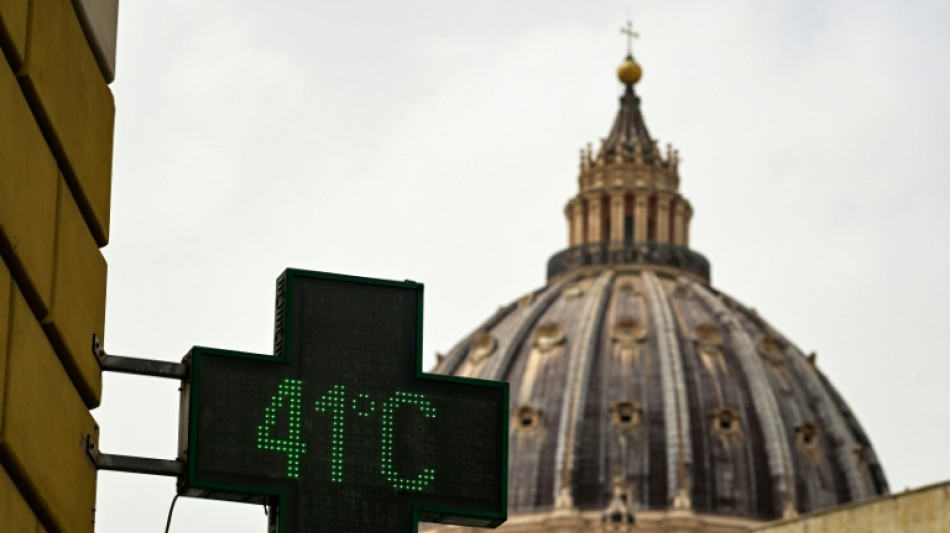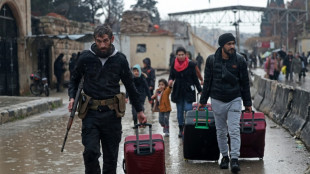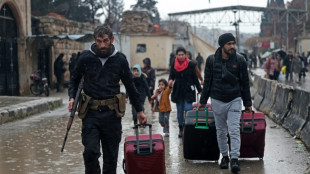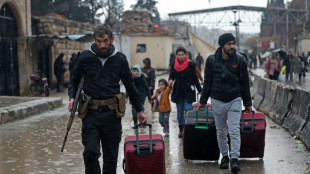
-
 Rallies across US after woman shot and killed by immigration agent
Rallies across US after woman shot and killed by immigration agent
-
Egypt dump out holders Ivory Coast as Nigeria set up AFCON semi with Morocco

-
 Rosenior salutes 'outstanding' start to Chelsea reign
Rosenior salutes 'outstanding' start to Chelsea reign
-
Maduro loyalists stage modest rally as Venezuelan govt courts US

-
 Byrne late penalty fires Leinster into Champions Cup last 16 after 'ding-dong' battle
Byrne late penalty fires Leinster into Champions Cup last 16 after 'ding-dong' battle
-
Rosenior makes flying start as Chelsea rout Charlton in FA Cup

-
 Rallies across US against shooting of woman by immigration agent
Rallies across US against shooting of woman by immigration agent
-
Salah closer to AFCON glory as Egypt dethrone champions Ivory Coast

-
 O'Neil ends 'crazy three days' with Strasbourg cup canter
O'Neil ends 'crazy three days' with Strasbourg cup canter
-
Mitchell leads Cavs over T-Wolves

-
 O'Neil ends 'crazy few days' with Strasbourg cup canter
O'Neil ends 'crazy few days' with Strasbourg cup canter
-
Argentina wildfire burns over 5,500 hectares: governor

-
 Byrne late penalty fires Leinster into Champions Cup last 16
Byrne late penalty fires Leinster into Champions Cup last 16
-
Roma beat Sassuolo to close in on Serie A leaders Inter

-
 Villa's FA Cup win at Spurs leaves Frank on the brink
Villa's FA Cup win at Spurs leaves Frank on the brink
-
Osimhen focused on Nigeria glory not scoring record

-
 Undav calls shots as Stuttgart thump Leverkusen
Undav calls shots as Stuttgart thump Leverkusen
-
Venezuelan prisoners smile to hear of Maduro's fall

-
 Thousands of Irish, French farmers protest EU-Mercosur trade deal
Thousands of Irish, French farmers protest EU-Mercosur trade deal
-
Kiplimo captures third straight world cross country title

-
 Osimhen leads Nigeria past Algeria into AFCON semi-finals
Osimhen leads Nigeria past Algeria into AFCON semi-finals
-
US urges fresh talks between Syria govt, Kurds after deadly clashes

-
 Weekend of US protests after woman killed by immigration agent
Weekend of US protests after woman killed by immigration agent
-
Monaco cling on with 10 men to avoid French Cup shock

-
 Rooney close to tears as brother masterminds FA Cup history
Rooney close to tears as brother masterminds FA Cup history
-
Semenyo scores on Man City debut in 10-goal rout of Exeter

-
 Villarreal sink Alaves to stay in La Liga hunt
Villarreal sink Alaves to stay in La Liga hunt
-
Bristol, Glasgow reach Champions Cup last 16

-
 Freiburg beat 10-man Hamburg to climb to eighth in the Bundesliga
Freiburg beat 10-man Hamburg to climb to eighth in the Bundesliga
-
Venezuela loyalists to rally one week after Maduro's capture

-
 Syrian authorities transferring Kurdish fighters from Aleppo to northeast
Syrian authorities transferring Kurdish fighters from Aleppo to northeast
-
Football: Five memorable FA Cup upsets

-
 Odermatt warms up for Winter Games with Adelboden giant slalom win
Odermatt warms up for Winter Games with Adelboden giant slalom win
-
Benin showcases culture with Vodun Days

-
 Iran crackdown fears grow as protests persist
Iran crackdown fears grow as protests persist
-
Odermatt wins Adelboden giant slalom for sixth World Cup success of season

-
 Holders Crystal Palace stunned by Macclesfield in biggest ever FA Cup shock
Holders Crystal Palace stunned by Macclesfield in biggest ever FA Cup shock
-
Odermatt wins Abelboden giant slalom for sixth World Cup success of season

-
 Poland reach United Cup final despite Swiatek loss to Gauff
Poland reach United Cup final despite Swiatek loss to Gauff
-
India's Gill calls it 'destiny' after shock T20 World Cup snub

-
 'Driven' Vonn storms to 84th World Cup win in Austrian downhill
'Driven' Vonn storms to 84th World Cup win in Austrian downhill
-
Syrian army says stopping Aleppo operations, but Kurds deny fighting over

-
 Thousands of Irish farmers protest EU-Mercosur trade deal
Thousands of Irish farmers protest EU-Mercosur trade deal
-
Vonn storms to 84th World Cup win in Austrian downhill

-
 Anger over fatal Minneapolis shooting fuels US protests
Anger over fatal Minneapolis shooting fuels US protests
-
New rallies erupt in Iran as crackdown fears grow

-
 Real Madrid not 'kamikaze' with Mbappe health: Alonso
Real Madrid not 'kamikaze' with Mbappe health: Alonso
-
South Africa defends naval drills with Iran, Russia as 'essential'

-
 Alcaraz beats Sinner in sold-out South Korea exhibition match
Alcaraz beats Sinner in sold-out South Korea exhibition match
-
'Racing against time': Death toll rises after Philippines trash site collapse


Over 60,000 Europeans died from heat during 2024 summer: study
More than 60,000 people died from heat in Europe during last year's record-breaking summer, a benchmark study said Monday, in the latest warning of the massive toll climate change is having on the continent.
With Europe heating up twice as fast as the global average, the Spain-based researchers suggested an emergency alert system could help warn vulnerable people -- particularly the elderly -- ahead of dangerous heatwaves.
"Europe experienced an exceptionally deadly summer in 2024 with more than 60,000 heat-related deaths, bringing the total burden over the past three summers to more than 181,000," said the study in the journal Nature Medicine.
The researchers at the Barcelona Institute for Global Health (ISGlobal) reached this figure by analysing mortality data in regions across 32 European countries that covered a population of 539 million.
The death toll during last year's summer -- which was the hottest in recorded history for both Europe and the world -- was estimated to be 62,775.
This was nearly 25 percent higher than the 50,798 estimated for 2023's summer, according to the study's newly revised figures. It remained below 2022's toll of 67,873.
However there are several sources of uncertainty for this kind of research, which means these are not "ultimate and precise" numbers, lead study author Tomas Janos of ISGlobal told AFP.
Taking this uncertainty into account, the 2024 study gave a wider estimate range of between 35,00 to 85,000 deaths.
It is difficult to establish how many people are killed by rising temperatures, because heat is very rarely recorded as a cause of death.
Beyond immediate effects such as heatstroke and dehydration, heat contributes to a broad range of potentially deadly health problems, including heart attacks, strokes and respiratory conditions.
According to the study, Italy was the country with the most heat deaths last summer with an estimated 19,000, followed by Spain and Germany, both with over 6,000.
When the size of the country's population was taken into account, Greece had the highest rate with 574 deaths per million people, followed by Bulgaria and Serbia.
- What about 2025? -
But what about the summer that recently ended in Europe, which is thought to be the hottest ever recorded in countries including Spain and the UK?
Last week a rapidly produced analysis estimated that human-caused climate change was responsible for around 16,500 deaths this summer -- though that was only in European cities, or a fraction of the continent's population.
Rather than waiting months and years for countries to release mortality data -- and the lengthy process to get published in a peer reviewed-journal -- the British researchers aimed to give a quicker snapshot of the 2025 toll.
Unlike Monday's study -- which looked at actual recorded deaths -- the rapid attribution study estimated how many people died from heat by extrapolating from previous years.
Janos said that both kinds of research played an important role, one offering a "first assumption" of heat deaths and the other giving "more robust, precise estimates" that could guide policy.
Monday's study also evaluated a tool that used weather forecasts to issue emergency alerts ahead of potentially deadly heatwaves. It found the alerts were reliable at least a week before the heatwave struck.
This early warning system is an "unexplored opportunity to save lives among the most vulnerable populations," ISGlobal's Joan Ballester Claramunt said.
B.Mahmoud--SF-PST



